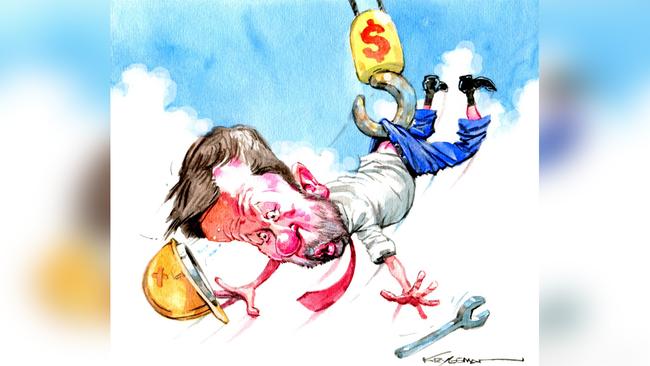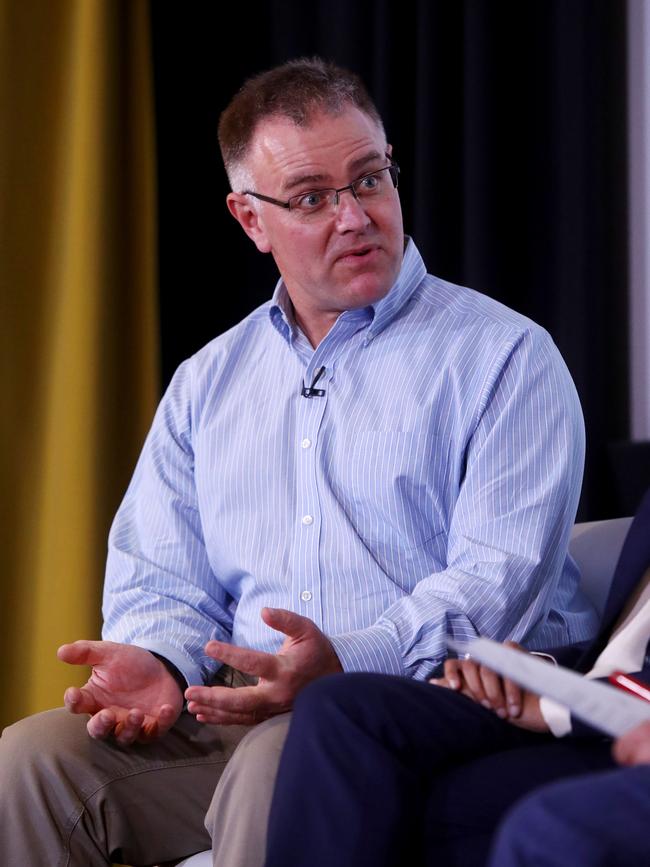
The deal smacks of one White and his lawyers put to the board as his position as chief executive became increasingly untenable, as opposed to one Dammery imposed on White.
White gets to stay on board on the same salary for 10 years, with the same duties except he is no longer a director or chief executive, which frees him from all those reporting obligations like share sales below the 1 per cent he must report as a roughly 34 per cent shareholder.
It’s still White’s company; he is still in control with the board in his pocket and is free of many of the statutory reporting obligations.
Better still he doesn’t have to trouble himself with corporate governance stuff that clearly he never cared much for in the past, until it caught up with him.
The deal is certainly good for White and just maybe for shareholders (of which he is the biggest) who get to share the spoils of his claimed genius.
Time will tell.


His behaviour has pushed another worry over the company to the fore, that being its rapid growth through acquisitions.
WiseTech is a classic roll-up – snapping up little logistic companies, replacing target software with his own and on to the next deal.
Back in the 1980s bull market this roll-up strategy was characterised by all sorts of accounting manoeuvres to make the numbers look better than they might be.
This is not to say this has happened at WiseTech but questions will now be surely be asked by ASIC to its auditor, KPMG, and the company.
The former head of the company audit committee, Christine Holman, quit in 2019 after just 10 months on the board complaining of its corporate governance failures, accusing White of “sustained intimidation and bullying … in the form of aggressive emails, one-on-one meetings and public berating in both audit and risk committee meetings and board meetings”.
This was reported in the context of White’s sexual liaisons but maybe accounting treatment was also on the agenda.
With the company now in the spotlight, ASIC will be closely examining how it grew so quickly and whether there was more to it than replacing target companies’ software with White’s own creations.
Hopefully this is not the case but for Dammery and the board the work really begins now with the hunt for a chief executive who can run the company while keeping the claimed brilliant founder onside and on the tools.
In his defence, Dammery was dealt a tough hand which was getting tougher by the day with more revelations and who knows how many pending staff complaints about the boss’s behaviour.
This way shareholders get to keep the guy who wrote the computer code on which the $33bn multinational is based.
The alternative would be to show the guy the door and cut off all ties which is not so easy when he owns a third of the company.
Thanks to White’s dream deal, Dammery has a temporary solution and now comes the hard bit of managing an actual transition to a functioning public company.
Watching this saga unfold, you begin to see why other tech start-ups are not rushing to list to expose themselves to all this scrutiny, and understand just why the US now has half as many public companies as it did 30 year years ago.
At WiseTech the reality is White has gone nowhere yet.
Is AI just a great plagiariser?
The AI-driven data centre gold rush has attracted everyone from AustralianSuper to property guru David Di Pilla, and in the US has driven big tech into nuclear power with Microsoft, Google, Amazon and others looking to sign deals.
Microsoft likes to think it’s the ESG flag waver but its carbon emissions are 30 per cent up since 2020 and Google reports a 50 per cent increase.
The big white hope is AI can find the answer to the climate challenge but so far it is doing the reverse.
Maybe Israeli historian Yuval Noah Harari may be right with the argument in his latest book, Nexus, that AI is to be treated with caution as the first technological revolution in which machines act without human intervention.
The initial concern is with AI stealing copyright material but when machine copies machine who knows the outcome?
One response is so far AI hasn’t come up with any new ideas – just copied others.
Lacklustre ministerial interest in anti-dumping
Infrabuild’s financial woes have sent it running to the Anti-Dumping Commission (ADC) looking for import protection in some traditional and questionable ways.
Federal Industry Minister Ed Husic’s office is responsible for the commission but his office has declined to comment, saying these are matters for the ADC.
It is now nine months since former ADC chair Bradley Armstrong retired but Husic is yet to name a replacement, happy to keep deputy Isolde Lueckenhausen as an acting chair.
This says something about Husic’s lack of interest in a body which has directly played a key role in increasing costs for downstream users and competition in the building sector.
This is confusing given how the government expresses concern for cost-of-living increases and housing shortages because dumping action impacts both – and in this case all – to help the overleveraged owner of Infrabuild and the ring-fenced Whyalla steel mill, Sanjeev Gupta.
The latest investigation is on reinforcing bar from Indonesia, Malaysia, Turkey and Vietnam.
The dodgy case is an anti-circumvention investigation which ordinarily happens when like goods are slipped in to evade duty, but in this case applies to steel mesh used for concrete which is claimed to be like steel rod coils.
This is akin to saying chocolate cake is the same as wheat, and worse, the commission has extended its investigation right up to March next year.
What happens when dumping investigations are started is trade stops because importers don’t want to run the risk of getting their margins wiped by dumping duties once orders are made.
BlueScope, the monopoly flat steel producer, knows this well because the US Commerce Department is now investigating US steel industry claims it has dumped coated steel in the US market.
Not a good look ahead of a potential election of an avowed protectionist in Donald Trump as US president and BlueScope is not making itself available for comment on the matter.
If imports stop, the local producer gets to increase prices, and in Australia the steel industry has two monopolies for flat and long products (Infrabuild) so they get a free run and building costs skyrocket.
German steel giant ThyssenKrupp has written to the ADC objecting to the ludicrous anti-circumvention case, noting the commission has the power to terminate the inquiry without troubling the admittedly disinterested minister.
It noted the time extension for “changing business requirements” was a nonsense and without it the case could already be over.
ThyssenKrupp noted: “Simply ‘parking’ an anti-circumvention inquiry for a long period of time is enough to slow down or stop trade activity in the products complained against.
“This starves important Australian industries (in this case, the construction, building and housing industries) of needed products and forces prices up, without there being any proven legal justification to do so. Not only is such an outcome WTO-illegal, it is also contrary to the national interest.”
It argued further: “There can be no ability to ‘extend’ anti-dumping measures to a downstream industry … and Infrabuild’s intentions to get that industry to shut down its machines and buy Infrabuild’s downstream steel mesh is as anti-competitive as one could imagine.”




It will be a miracle if WiseTech’s sham settlement with Richard White lasts and the hard work is now just beginning for chair Richard Dammery and his board.